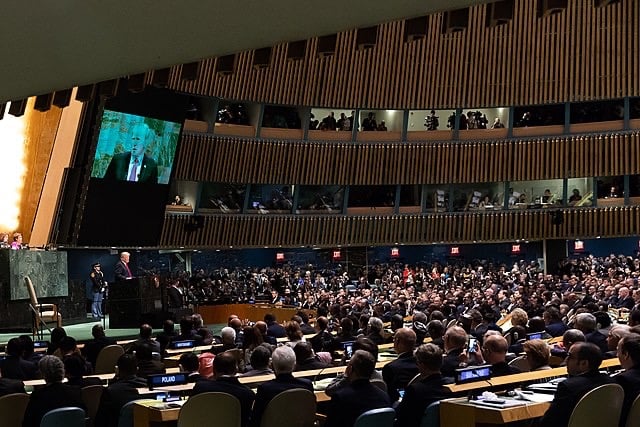President Donald Trump launched a blistering attack on the United Nations during his General Assembly speech on Tuesday, accusing the international organisation of funding and facilitating an “assault on Western countries” through its support of migrants, whilst warning European leaders that their nations were “being destroyed” by uncontrolled immigration.
In his most provocative comments, Trump claimed the UN was actively undermining national sovereignty by providing material support to illegal immigrants. “The United Nations is funding an assault on Western countries and their borders,” he declared from the rostrum in New York.
The President specifically cited UN programmes that provide “food, shelter, transportation and debit cards to illegal aliens,” arguing that the organisation “is supposed to stop invasions, not create them and not finance them.
Trump’s accusations appear to reference documented UN programmes that provide cash assistance to migrants through what the organisation calls “cash-based interventions” (CBI). According to UN planning documents, the organisation and its partners budgeted approximately $372 million in 2024 for “Cash and Voucher Assistance” and “Multipurpose Cash Assistance” to an estimated 624,000 migrants in transit through Latin America.
These funds are typically distributed through pre-paid debit cards bearing UNHCR logos, bank transfers, and sometimes cash in envelopes. The UN states these programmes are designed to “restore feelings of choice and empowerment to beneficiaries” and help vulnerable populations meet basic needs.
Turning his attention to Europe, Trump painted an apocalyptic picture of the continent’s future, declaring it was in “serious trouble” due to immigration. “They’ve been invaded by a force of illegal aliens like nobody’s ever seen before,” he said. “Your countries are being ruined.”
The President was particularly direct in his warning to European leaders: “I see it, I’m not mentioning names, I see it and I could call every single one of them. You’re destroying your countries, they’re being destroyed.”
He added that “illegal aliens are pouring into Europe, and nobody’s doing anything to change it, to get them out. It’s not sustainable.”
Trump’s rhetoric echoed his recent statements made during a July visit to Scotland, where he declared that “immigration is killing Europe” and described the situation as a “horrible invasion.” These comments align with far-right “Great Replacement” theories that have gained traction in certain European political circles.
The President claimed that his administration had successfully closed America’s borders, stating: “Once we started detaining and deporting everyone who crossed the border and removing illegal aliens from the United States, they simply stopped coming. They’re not coming anymore.”
He contrasted this with what he described as Europe’s failure to address its migration challenges, though he did acknowledge that some European leaders “have not let it happen” and deserved credit, though he declined to name them to avoid “embarrassing the other ones.”
Trump’s attack on UN migration programmes comes as Republican lawmakers have increasingly targeted the organisation’s activities. Texas Representative Lance Gooden and other House Republicans have proposed legislation to defund UN programmes they view as facilitating illegal immigration to the United States.
The controversy centres on the scale and scope of UN assistance along migration routes. In Mexico’s Tapachula, for instance, hundreds of migrants queue daily at UN facilities to apply for cash assistance, with recipients receiving monthly payments ranging from approximately $180 to $300 per person.
The UN defends these programmes as humanitarian assistance for vulnerable populations, many of whom it classifies as refugees fleeing persecution. However, critics argue that by providing financial support, transportation assistance, and other services to migrants “in transit,” these programmes effectively subsidise illegal border crossings.
Trump’s speech also criticised recent moves by several US allies, including the UK, France, and Canada, to recognise Palestinian statehood. He called such recognition “a reward for these horrible atrocities, including October 7,” referring to Hamas’s attack on Israel.
The President’s combative tone extended to his broader critique of the UN itself. Not only is the UN not solving the problems it should, too often it’s actually creating new problems for us to solve,” he said, identifying migration as “the number one political issue of our time.
European reactions to Trump’s comments have been mixed. Whilst some right-wing politicians have welcomed his tough stance on immigration, others have criticised his characterisation of Europe as being “invaded” and “destroyed.
The President’s speech comes as Europe continues to grapple with migration challenges. The UK has seen a 57 per cent increase in Channel crossings this year, with nearly 22,500 people arriving by small boat. Net migration to the UK stood at 431,000 last year, though this represented a slight decrease from previous years.
Trump’s administration has already withdrawn US funding from several UN agencies, including UNESCO and the World Health Organization. The United States remains the UN’s largest donor, contributing approximately 22 per cent of the organisation’s regular budget.
In defending his “America First” approach, Trump declared: “We have reasserted that America belongs to the American people, and I encourage all countries to take their own stand in defence of their citizens as well.”
The speech marked a stark departure from traditional diplomatic language at the UN, with Trump speaking partly without a teleprompter due to technical difficulties. “That way you speak more from the heart,” he quipped, before launching into his attacks.
As migration continues to dominate political debates on both sides of the Atlantic, Trump’s provocative speech has highlighted the growing divide between nationalist approaches favouring strict border controls and international humanitarian frameworks supporting refugee assistance.
The UN has not yet formally responded to Trump’s specific allegations about its migration programmes, though officials have previously defended cash assistance as a more efficient and dignified form of humanitarian aid that also supports local economies where migrants temporarily reside.
With Trump threatening sanctions on Russia if European nations don’t join American measures, and his administration pursuing aggressive tariff policies, his UN speech has set a confrontational tone that is likely to further strain transatlantic relations already tested by disagreements over trade, defence spending, and now migration policy.
Follow for more updates on Britannia Daily



